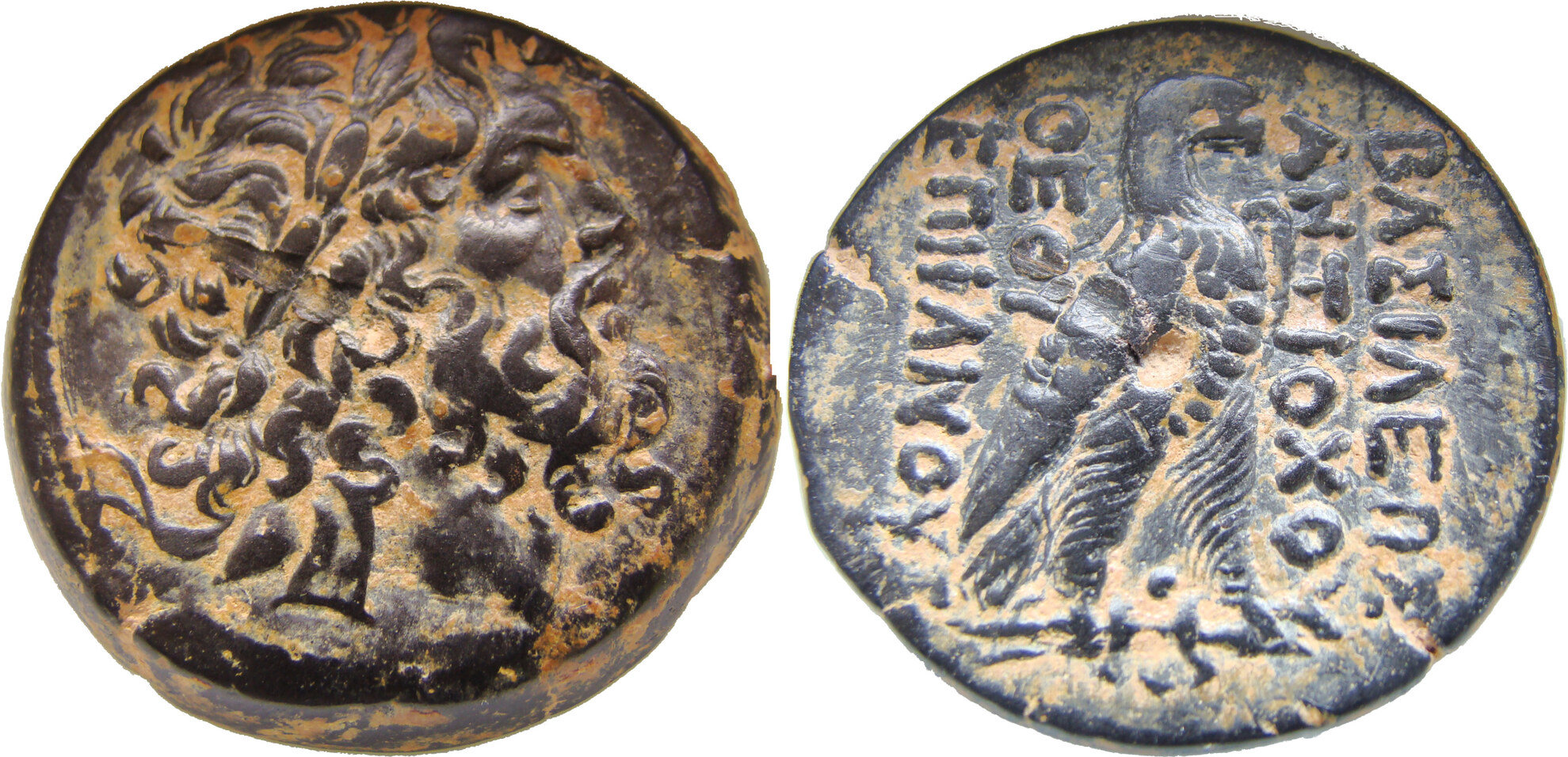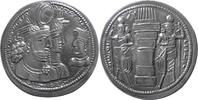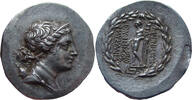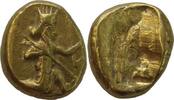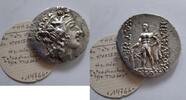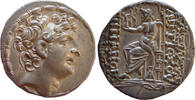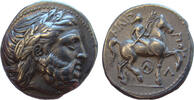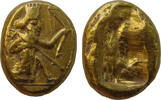MA-ID: 802388
Customer feedback Decapolis
Tout a été parfait merci beaucoup +++Merci beaucoup pour votre feedback.
...
Really beautiful coin. Sorry because of the late feedback. It is just becau...
Excellent Tetradrachm coin of Vespasian! Very satisfied!!!Thank you for you...
perfect !!!Thank you for your feedback.
...
Seleucid Antiochos IV Epiphanes. 175-164 BC. Æ *Beautiful style of Zeus* * 38.70 g*
DECAPOLIS Numismatics 

3
On MA-Shops since 3 years
71 ratings,
100 % Positive (last 24 months)
Worldwide shipping
1,040.34 £1200,00 EUR
Discount 86.70 £ / 8%
Import tax may be added
+ 24.27 £ shipping ( to United Kingdom )
Delivery time: 6 - 10 days
+ 24.27 £ shipping ( to United Kingdom )
| Customer Support +49 (0)2871 2180 383 |
| Payment methods |
| Wire Transfer |
Bronze
38.70 g
32.00 mm
Obv:Laureate head of Zeus-Serapis right, wearing tainia with Osiris cap at tip
Rev:Eagle with closed wings standing right on thunderbolt.
SC 1413
Great style of ZEUS.
Antiochos IV Epiphanes, who reigned from 175 to 164 BC, was one of the most notable rulers of the Seleucid Empire. He was the son of Antiochos III the Great and came to power after a turbulent period, succeeding his brother Seleukos IV. Antiochos IV is remembered for his ambitious policies, both domestic and military, and his controversial efforts to impose Hellenistic culture on his subjects, particularly in Judea, which led to significant resistance. One of his most ambitious undertakings was his attempt to consolidate and expand the power of the Seleucid Empire. Militarily, he led campaigns in Egypt, engaging in a series of conflicts with the Ptolemaic Kingdom. He sought to place Egypt under Seleucid control, but was ultimately thwarted by Roman intervention, particularly during his second invasion in 168 BC, when the Roman envoy famously drew a circle in the sand around him and forced him to retreat, marking the end of Seleucid expansion into Egypt. Domestically, Antiochos IV focused on promoting Hellenistic culture throughout his empire, often in ways that created friction with local populations. His reign is particularly infamous for his actions in Judea, where he aggressively attempted to impose Greek religion and culture, culminating in the desecration of the Second Temple in Jerusalem. He outlawed Jewish religious practices and erected an altar to Zeus in the temple, sparking the Maccabean Revolt (167–160 BC). This revolt, led by Judas Maccabeus and his followers, eventually led to Jewish independence from the Seleucid rule. Antiochos IV styled himself with the epithet "Epiphanes," meaning "God Manifest," reflecting the divine status he claimed. However, he was sometimes referred to mockingly as "Epimanes" (the Madman) by his contemporaries, likely because of his erratic behavior and grandiose claims of divinity. Despite his ambitious efforts to strengthen the Seleucid Empire, Antiochos IV's reign marked the beginning of its decline. His military failures and the revolt in Judea drained the empire's resources. He died suddenly in 164 BC during a campaign in the east, possibly from illness, leaving his young son Antiochos V Eupator to succeed him, further weakening the empire. His legacy is a complex one, marked by both bold cultural ambitions and significant military and political failures.
Rev:Eagle with closed wings standing right on thunderbolt.
SC 1413
Great style of ZEUS.
Antiochos IV Epiphanes, who reigned from 175 to 164 BC, was one of the most notable rulers of the Seleucid Empire. He was the son of Antiochos III the Great and came to power after a turbulent period, succeeding his brother Seleukos IV. Antiochos IV is remembered for his ambitious policies, both domestic and military, and his controversial efforts to impose Hellenistic culture on his subjects, particularly in Judea, which led to significant resistance. One of his most ambitious undertakings was his attempt to consolidate and expand the power of the Seleucid Empire. Militarily, he led campaigns in Egypt, engaging in a series of conflicts with the Ptolemaic Kingdom. He sought to place Egypt under Seleucid control, but was ultimately thwarted by Roman intervention, particularly during his second invasion in 168 BC, when the Roman envoy famously drew a circle in the sand around him and forced him to retreat, marking the end of Seleucid expansion into Egypt. Domestically, Antiochos IV focused on promoting Hellenistic culture throughout his empire, often in ways that created friction with local populations. His reign is particularly infamous for his actions in Judea, where he aggressively attempted to impose Greek religion and culture, culminating in the desecration of the Second Temple in Jerusalem. He outlawed Jewish religious practices and erected an altar to Zeus in the temple, sparking the Maccabean Revolt (167–160 BC). This revolt, led by Judas Maccabeus and his followers, eventually led to Jewish independence from the Seleucid rule. Antiochos IV styled himself with the epithet "Epiphanes," meaning "God Manifest," reflecting the divine status he claimed. However, he was sometimes referred to mockingly as "Epimanes" (the Madman) by his contemporaries, likely because of his erratic behavior and grandiose claims of divinity. Despite his ambitious efforts to strengthen the Seleucid Empire, Antiochos IV's reign marked the beginning of its decline. His military failures and the revolt in Judea drained the empire's resources. He died suddenly in 164 BC during a campaign in the east, possibly from illness, leaving his young son Antiochos V Eupator to succeed him, further weakening the empire. His legacy is a complex one, marked by both bold cultural ambitions and significant military and political failures.
Payment :
- The preferred method of payment is via bank transfer (IBAN or WISE).
-Alternatively, via (PayPal, + 5%)
| Shipping fees | |||||||
|---|---|---|---|---|---|---|---|
| 0.87 £ to 433.48 £ | 434.34 £ to 606.87 £ | 607.73 £ to 866.95 £ | 867.82 £ to 1,300.43 £ | 1,301.29 £ to 2,167.38 £ | 2,168.24 £ to 3,467.80 £ | over 3,468.67 £ | |
| Belgium | 10.40 £ | 10.40 £ | 13.00 £ | 13.00 £ | 14.74 £ | 14.74 £ | Free shipping |
| Germany | 13.00 £ | 13.00 £ | 13.87 £ | 13.87 £ | 13.87 £ | Free shipping | Free shipping |
| United Kingdom | 13.00 £ | 13.87 £ | 14.74 £ | 24.27 £ | 24.27 £ | 30.34 £ | 30.34 £ |
| Canada | 13.00 £ | 16.47 £ | 41.61 £ | 47.68 £ | 47.68 £ | 47.68 £ | 47.68 £ |
| Luxembourg | 13.00 £ | 16.47 £ | 19.94 £ | 21.67 £ | 21.67 £ | 24.27 £ | Free shipping |
| Switzerland | 13.00 £ | 19.94 £ | 20.81 £ | 24.27 £ | 24.27 £ | 28.61 £ | 28.61 £ |
| European Union | 13.00 £ | 13.00 £ | 13.87 £ | 15.61 £ | 15.61 £ | 16.47 £ | Free shipping |
| World | 16.47 £ | 16.47 £ | 20.81 £ | 47.68 £ | 47.68 £ | 47.68 £ | 47.68 £ |
Information
Online orders are welcome as always and will be shipped directly.
|
Seller Home | 0Shopping cart | Terms of sale | Contact | MA Terms of sale | Privacy policy | Warranty | MA-Shops New Items Copyright ® 2001-2025, MA-SHOPS Coins All Rights Reserved. Designated trademarks and brands are the property of their respective owners. |
 Buy coins with warranty
Buy coins with warranty


